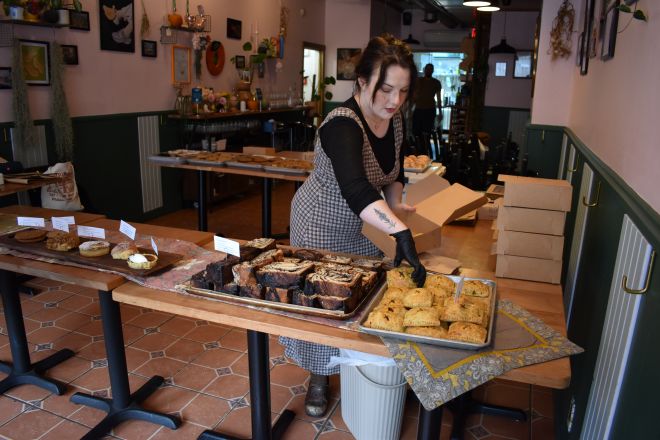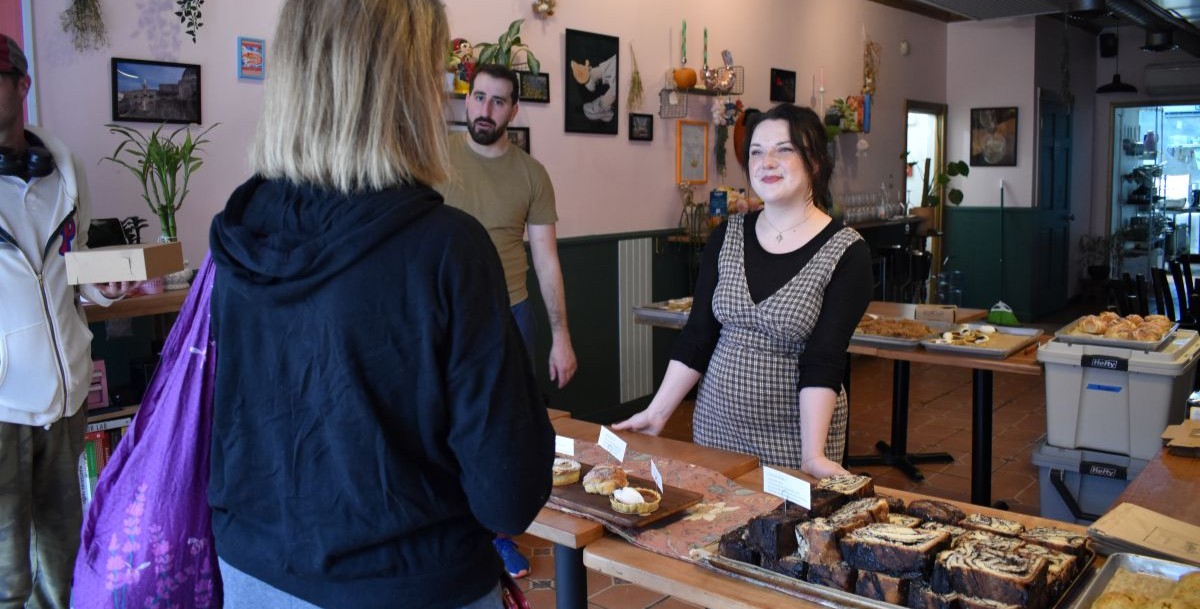I first stumbled across Rougarou Baking, a bakery specializing in Jewish and Creole-inspired pastries, on Instagram about a week before I literally stumbled on them, walking past their folding table outside a rowhome just a couple blocks away from my new house in Queen Village. Hopping into line became part of my weekly routine on the way to Headhouse Farmers Market on Sunday mornings.
Standing in line, I met new neighbors: parents navigating strollers amid sidewalk cracks, a woman wearing a purple shirt emblazoned with “well behaved women rarely make history,” a fellow gardener with a plot in the Southwark-Queen Village Community Garden who anxiously kept an eye on Rougarou’s babka quantity every week. Sure, there was a fair bit of phone scrolling, but there were moments of connection, too: talking about tomatoes, waving to Paige (the baker) when she brought out a tray of goodies straight from the oven, holding a spot for a neighbor who forgot their wallet at home.
Pop-ups in Philadelphia
Gritty and scrappy as Philly is, it shouldn’t surprise anyone that our city is supportive of pop-up bakers — home- or professionally-trained bakers who sell delicious treats in front of their home, in another local business, or at a farmers’ market, instead of at their own brick-and-mortar.
Exploding since the pandemic altered restaurant norms and dining habits, pop-ups are now commonplace, with locations and menus largely communicated via Instagram. A sampling of such Philly-based pop-ups I follow on Instagram include: Rougarou Baking, Manna Bakery, Guilty Good Pastries, Bake with Mii, Habibi Supper Club, Philly Hummus Girl, Sweet Dreams Come True, and Bask Bakery.
For many bakers, having a pop-up offers the opportunity to build clientele and buzz around their business, while generating a revenue stream and keeping overhead low, making the leap to an “official” bakery (or restaurant) with a permanent address a bit easier. Here in Queen Village, Majdal Bakery, located on 5th Street near South Street, began as a pop-up. Majdal popped up at Herman’s Coffee, Riverward Produce, Stump, Bodie, and more, before opening its permanent bakery location at 618 S 5th Street in November 2024.
From pop-up to a “demi-permanent” space
Baker Paige Wernick, who has spent 12 years as a pastry chef, is the general manager at Scampi Supper Club; her husband Zachary has spent a decade in the culinary industry, currently as a baker at Curiosity Doughnuts outside Doylestown. Paige hails from the New Orleans area, while Zachary is from the Philadelphia area. The two met “down south” and infuse their treats with her Creole roots and his Jewish heritage.
“When Covid hit, it was a wake-up call,” Paige says. “We wanted to spend time with our family and get to hear family stories from people who were getting older.” They packed up and moved to Philly, where they found a warm and welcoming community.
They first set up a table with baked goods outside their home on October 6, 2024. Seasonal treats like tarts can vary, but chocolate babka, cardamom buns, jambalaya hand pies, brown butter chocolate chip cookies, and ginger cookies are menu staples. In under a year, they’ve cultivated a reliable following among their fellow Queen Village neighbors (on a busy Sunday they see around 60 customers), and in September, 2025 they graduated from their stoop to a “demi-permanent” location, in local restaurant Scampi Supper Club just a few blocks away on 3rd Street. In the post announcing the move, the Wernicks wrote they had “outgrown” their current space, and were relocating “out of love and respect for our neighbors.”
 Paige Wernick organizes her fresh-baked wares
Paige Wernick organizes her fresh-baked wares
Dutifully, the following Sunday I trooped a couple additional blocks and waited outside, chatting with folks and grabbing a cardamom bun before cutting back over to 2nd Street towards Headhouse. Sure, the lines had gotten a bit longer, and it wasn’t a secret that Rougarou was hoping to eventually grow their own brick-and-mortar, but the fellow regulars I spoke with were grateful that they’d be sticking around the neighborhood. While rent in Queen Village isn’t cheap, there’s something to be said for proximity.
“Not many places are as supportive as Philly has been to small businesses,” says Paige. “Philly loves a pop-up, an underdog, it’s very community-based.” Paige is grateful for people like Liz Grothe, the owner of Scampi, who “has no reason to let us be here other than kindness.” She also nods to Ace Coffee, which carries Rougarou Baking pastries on Sunday mornings. “They took a chance on us when we were so new, like a month after we started baking,” she says.
That community support has enabled Rougarou to continue thriving, even when faced with challenges. “Philly is such this little perfect nugget for really trying to make something out of nothing,” Paige says. “It’s lagniappe — [the New Orleans phrase for] a little something extra. People kind of just doing good for the sake of doing good. There’s room for everybody! We’ve gotten to know so many other bakers… if we were anywhere else, the scarcity mindset would set in, but here it’s the exact opposite.” In fact, when I last left Rougarou, Paige and Zachary were headed out to eat at Habibi’s brunch pop-up at Kiddo.
Overheard at Rougarou
I walked to Scampi last Sunday to hang out in line and chat with some fellow regulars for this story. People milled in and about freely, and Paige and I chatted for the story in between customers.
Paige says their current customer base is about a 50/50 split between regulars and people who are new to Rougarou. People have found out they were neighbors while chatting in line, and some favorite regulars include Caroll D. & Daryl B., New Orleans transplants who, similar to Paige and Zachary, are a couple with one New Orleans partner and one Jewish partner. Neighbors who live around the corner, they have been champions for the bakery over the past year. “We adore them,” says Paige. “Everyone is so kind, it’s crazy,” adds Zachary.
Rob T., another regular, often buys multiple jambalaya hand pies, freezing them so he can enjoy them throughout the week until Rougarou opens again. “There’s a couple who started coming when she was freshly pregnant and now they come with the baby,” says Paige.
Given how well they know their regulars, it wasn’t a surprise that regulars knew them too; a few asked how Paige and Zach’s weekend prior had been (they went apple-picking, the fruits of which were turned into the week’s apple normandy pastries), and nearly everyone commented on the lack of a line.
Some favorite snippets from the morning:
“Last weekend we tried to get babka somewhere else… it was not the same.”
“Last week I got the ginger cookie and it changed my life.”
And perhaps most relatable to me: “This has become a bit of a Sunday staple.”
Outgrowing the pop-up model
Moving to a bigger space with a commercial kitchen would enable Rougarou Baking to bake more offerings more often, so people can come by throughout the day without fear that the bakery will have sold out; to take more special orders and holiday orders; and to offer new treats like Kings Cakes, a New Orleans treat, on Mardi Gras. (The Wernicks declined to say how much money they earn from their weekly sales, or how much they need to save in order to open their own kitchen.)
“Rougarou really is a love letter to each other and each other’s background,” says Paige. “Zachary is sharing family recipes and traditions of his. I had never made challah before, and now we’ve honed the recipe together. He’d never had Creole food before me. It’s another way to open ourselves up to each other. Food is a great unifier; it always has been and always will be. It’s our love language.”
![]() MORE ON PHILLY’S FOOD SCENE
MORE ON PHILLY’S FOOD SCENE
Rougarou Baking

